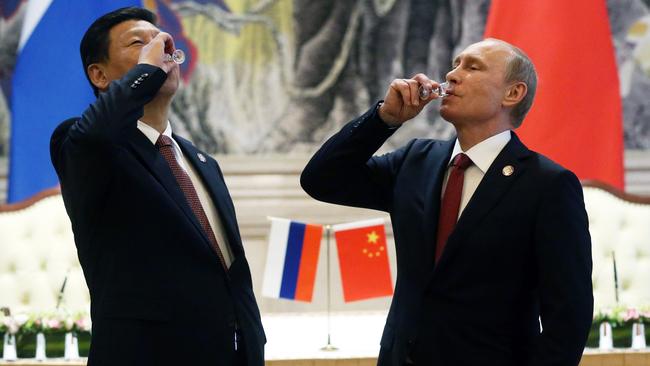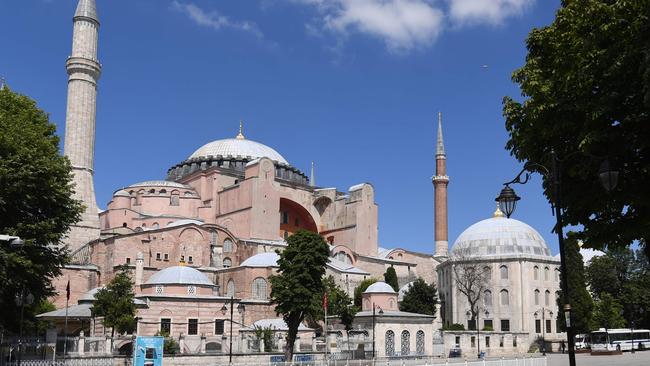Everlasting rulers’ club wants more of a legacy than a mere statue

Now, the Turkish leader Recep Tayyip Erdogan has decided to end the unmosquing of Hagia Sophia, which still sits atop what is now Istanbul. A Bosnian imam has been appointed and the president hopes that Muslims will be able to pray there this week to give thanks for the squashing of a coup against him four years ago. Pope Francis is said to be dismayed, which is Vatican-speak for furious.

Erdogan’s purpose is not just to deck himself in the mantle of Mehmet, the sultan who laid the foundations of a world empire. Like other long-serving autocrats he hungers for political immortality. Not the kind that the former Kazakh president Nursultan Nazarbayev wanted when he set his top scientists the task of finding the elixir of life; after two years and millions of dollars of investment the best they could come up with was a stomach-friendly yoghurt.
Rather, he and other members of the everlasting rulers’ club want to create and consolidate pivotal moments in their reign that make it impossible for successors to debunk them or undo their work. The likes of Vladimir Putin (20 years in power), Xi Jinping (only seven but plenty more to come) or Erdogan (17 years) are not interested in creating a line of dynastic succession. They crave something more than finding ways of shielding themselves from prosecution or keeping their personal fortunes intact when they eventually lose presidential immunity. They’re looking to the history books.
When Putin snatched Crimea in 2014 he saw it as partial compensation for the humiliation of the undignified 1991 collapse of the Soviet Union. He undoubtedly sees the land grab as his greatest achievement, a demonstration of Russian self-confidence. At the time of his KGB enrolment, aged 23, the agency was still smarting from Nikita Khrushchev’s public denunciation of Stalin and of the repressive state some 20 years earlier. How could one leader brazenly denounce another, unravel the good, heroic memories while exposing the bad? Putin is determined that his legacy won’t be shredded by whoever takes over in the Kremlin. Crimea is something that won’t be undone. That’s why all talks on normalising the Ukrainian-Russian relationship have come to naught.
Indeed the Russian annexation of Crimea is taught in Chinese military academies as a masterpiece of hybrid warfare, one that secured territory while disguising the operation for as long as possible. One that broke international law but left the West largely helpless. A model, in other words, for what the Chinese regime portrays as the “pacification” of Hong Kong. The two cases are not strictly comparable but the motivations of the Russian and Chinese leaders certainly are. Xi wants to end a “century of humiliation” that began with the Opium Wars.
Crushing the autonomy of Hong Kong is thus about two things. It is an example to any other part of China that imagines it can break free from the dead hand of the Communist Party and its security machine. That’s a message to Tibet, which could enter a time of political turmoil when the current, exiled, Dalai Lama dies. And a message to Taiwan, which Beijing still stubbornly regards as a maverick province rather than as a successful and de facto independent state.
The second addressee of Xi’s subjugation of Hong Kong is Britain. The former colonial power is being shown that its moral responsibility to Hong Kong amounts to nothing. That the British bond to the territory is grounded on a sentimental attachment formed in an era when it was exploiting and corrupting China. That’s why the increasingly rough-tongued Chinese ambassador feels free to threaten his host nation. He knows that the logical consequence of the Xi line is to pile more and more punishment on a Britain that is desperate for a trading relationship with Beijing. If Britain allows 200,000 Hongkongers to settle here, if it bans Huawei from 5G and thus undermines European trust in the company, then China will respond harshly. Because as long as Xi considers the reintegration of Hong Kong to be part of his lasting legacy, the row with Britain is likely to be personal and irritable.
As for Erdogan, Hagia Sophia is an indicator of his personal ambition to be the key figure in the reconstruction of the Middle East. He has come to the aid of the internationally recognised government in Libya, his troops and allied militias are active in northern Syria. A Turkish state television commentator has even floated the idea that the president may one day become caliph of the Muslim world.
Much depends, as various plans unfold, on Erdogan’s health. But it is clear that the three leaders are at an age, 66 (Erdogan) and 67 (Putin and Xi), when men and women start to sort out priorities for the rest of their lives. None of them is a fan of statues and Putin certainly does not want to be mummified like Lenin. They do, however, all want to leave behind nations that are eternally grateful to them. That’s a dangerous moment – when vain men with powerful armies start to become reckless risk-takers.
The Times



Mehmet the Conqueror rode into Constantinople on a white horse and ripped down the statue of Emperor Justinian in front of the huge Byzantine church, Hagia Sophia. The church should become a mosque, commanded the 21-year-old ruler, and the ornate Christian mosaics were duly covered up. That was in 1453 and remained so for almost five centuries until Kemal Ataturk had the shrine turned into a museum.